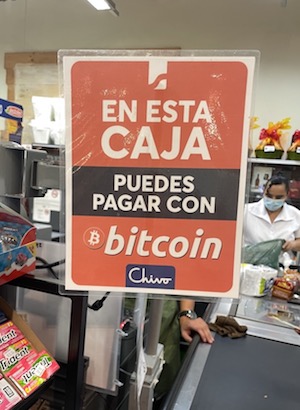I attempted to spend two weeks travelling in El Salvador living on Bitcoin. I tried to pay for every single thing with Bitcoin, or Satoshis, small amounts of Bitcoin. Spoiler alert, I failed.
Outfoxed by car hire companies (fortunately my car of choice was not Fiat); stubborn restauranteurs, a parking meter, pupusas, and a fancy dress shop where I was obliged to purchase a multicoloured wig with a $5 bill, I could not survive in “Bitcoin Country” on Bitcoin alone.
So where did I go wrong? How did this happen? Isn’t El Salvador supposed to be Bitcoin Country? Is Bitcoin broken? Am I a scammer?
First up, there’s no denying: El Salvador is unashamedly a Bitcoin destination. From Bitcoin conferences, big name Bitcoiners, ubiquitous “Bitcoin accepted here” signs, a laser eyed President and oodles of Bitcoin investments streaming into the country like transactions into the Bitcoin mempool, the nation is the first and greatest sign of Bitcoin adoption worldwide.
Moreover, let’s not forget the motivations behind the the “Ley Bitcoin,” or Bitcoin Law, voted in on June 8th 2021. In a statement, El Salvador’s National Assembly, shareed:

“With the aim of generating employment opportunities, promoting true financial inclusion and generating economic dynamism, the deputies of the Legislative Assembly approved the Bitcoin Law.”
Considering the law’s three goals, it’s mission accomplished. El Salvador’s GDP is hockeysticking higher; job creation has ticked up; tourism soared over 30% just this year and figures for the government supported Bitcoin wallet, Chivo, would suggest that the country is banking the unbanked.
In addition, I have plenty of personal anecdotes of friends and Bitcoin people who emigrated to El Salvador, established businesses in El Salvador, or simply visited the country for the first time–when never in a hundred years would El Salavdor feature on their bucket list holiday destinations prior to Bitcoin. But when it comes to paying in Bitcoin, it’s tough.
Bitcoin was mapped out as a “peer-to-peer cash electronic cash system,” the first line of the Bitcoin White Paper states. 14 years on, and one year after El Salvador announced Bitcoin as legal tender for payments, it’s not quite there.
Upon closer observation of the Bitcoin Law, it becomes clear that Bitcoin as a medium of exchange is not…
Click Here to Read the Full Original Article at Cointelegraph.com News…
























